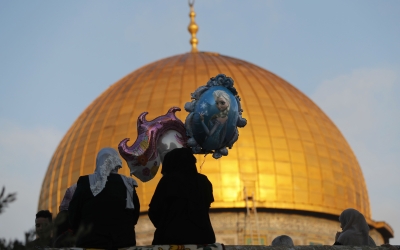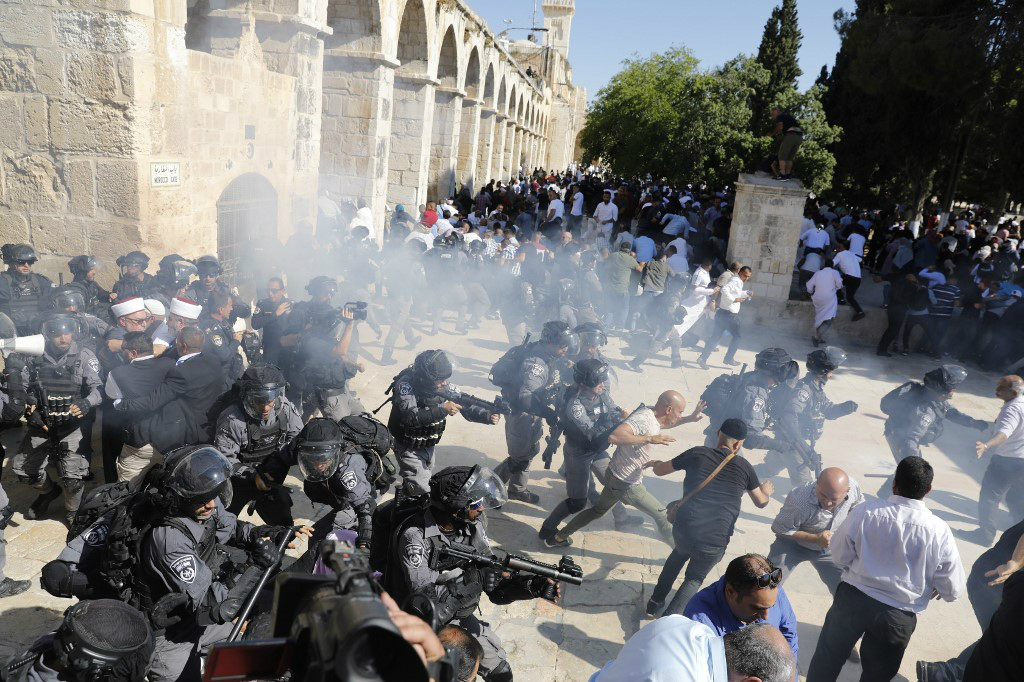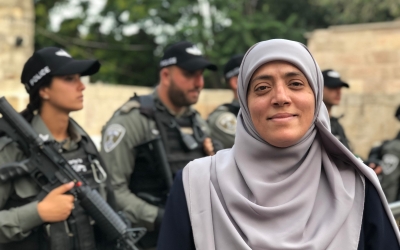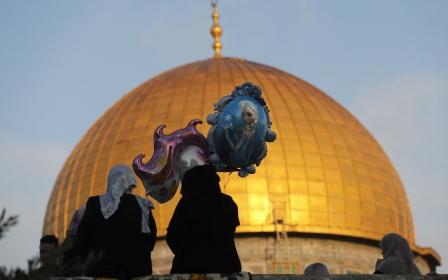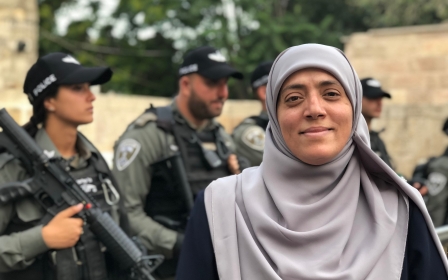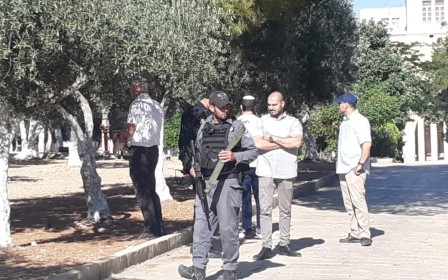Israeli forces fire tear gas and rubber bullets inside Al-Aqsa on first day of Eid
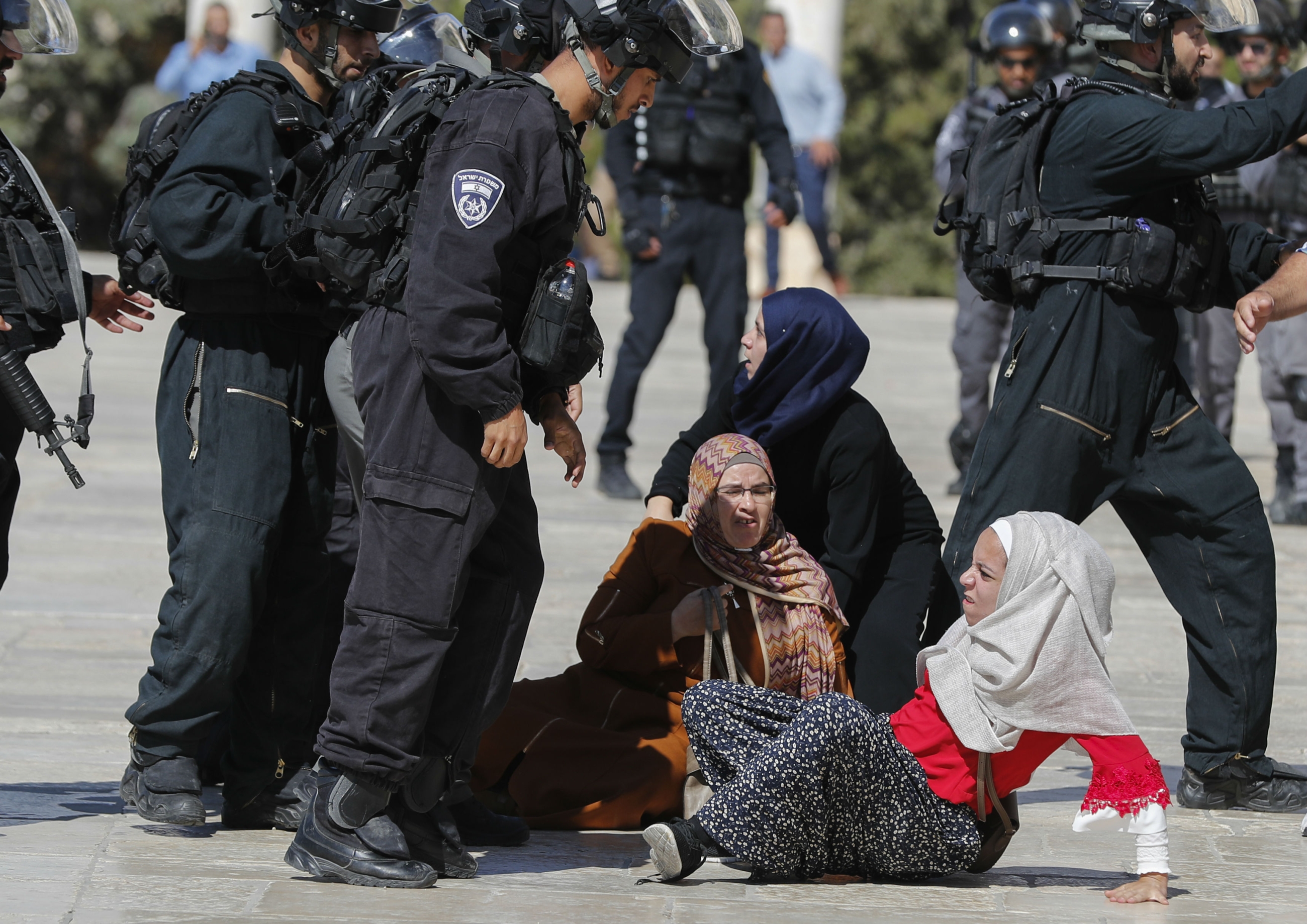
Israeli police fired rubber bullets and tear gas inside the Al-Aqsa compound in Jerusalem on Sunday after worshipping Muslims objected to around 450 Israeli settlers being allowed into the holy site despite it being the first day of Eid al-Adha.
The Muslim celebrations coincided with the Jewish holiday of Tisha B'av, which sees an increase in Jewish visits to the Al-Aqsa compound.
The Israeli actions broke up the festival atmosphere inside the area as thousands of Muslims worshippers had gathered to celebrate Eid al-Adha.
The Red Crescent said that at least 61 Palestinians were injured, with 15 taken to hospital for treatment.
Israel's Kan public radio said four police officers were injured.
Israeli police said seven people were arrested.
Palestinian organisations had earlier called on Muslims to perform Eid prayers in Al-Aqsa on Sunday after Jewish groups had announced plans to storm the compound to mark the Jewish holiday.
Jordan condemnation
Jordan, the custodian of Islamic and Christian holy sites in Jerusalem, condemned Sunday's actions by Israeli authorities.
Jordan's foreign ministry criticised what it described as "blunt Israeli violations... as Palestinians mark the first day of Eid al-Adha."
"Jordan harshly rejects Israel's conduct, which only inflames rage and frustration and its provocations of worshippers on the first day of the Feast of the Sacrifice," a spokesperson for the ministry said.
He added that Israel bears full responsibility for the future ramifications of the clashes and called on the international community "to immediately intervene to stop this conduct".
In a tweet, Jordanian Foreign Minister Ayman Safadi said: “We call upon the international community to hold Israel accountable and pressure it to cease its violations.”
The Palestinian Authority (PA) issued a statement calling for Arab and Islamic states to "take action" towards the international community and Israel "to stop the aggression against worshippers".
The PA also called for an emergency Security Council meeting to provide international protection for Palestinians and their holy sites.
Settler lobbying
In a bid to ease tensions, local authorities had said they would ban non-Muslims, including Jews, from visiting the site on Sunday.
However, sources told Middle East Eye that hundreds of Israeli settlers were allowed in on Sunday morning in what they said was the first time that this had ever been allowed to happen on the first day of Eid.
More settlers were reported to have been allowed in later in the day.
Settler groups had been lobbying Israeli authorities to allow Jewish visitors on the site during Tisha B'av, so they could mourn the destruction of a temple believed to have been located there 2,000 years ago.
Fearing Jewish worshippers would be allowed in, hundreds of Palestinians had held a demonstration on Sunday outside one of the gates to stop them entering the holy mosque.
Facing off with police in the packed compound, Palestinians chanted: "With our soul and blood we will redeem you, Aqsa."
Scuffles ensued and the crowd fled as sound grenades exploded and smoke wafted through the compound, witnesses said.
"It's our mosque, it's our Eid," said Assisa Abu Sneineh, 32, adding she was there when the clashes erupted.
"All of a sudden [security forces] arrived and began to hit and fire sound grenades," she told the AFP news agency.
Among the injured was the head of the Islamic Waqf, Abdel Azeem Salhab, who helps administer the Al-Aqsa compound.
Pictures posted online showed crowds running away from the police to escape the tear gas and rubber bullets.
'Act of recklessness and aggression'
Hanan Ashrawi, a senior official in the Palestine Liberation Organisation, accused Israel of provoking religious and political tension.
"The storming of Al-Aqsa mosque compound by Israeli occupation forces this Eid morning is an act of recklessness and aggression," she said in a statement.
The status of the Al-Aqsa compound is one of the most sensitive issues in the Israeli-Palestinian conflict.
The Al-Aqsa compound - which includes Al-Aqsa Mosque and the Dome of the Rock - is considered the third-holiest mosque in Islam.
Muslims believe that the Prophet Muhammad ascended to heaven from there, as mentioned in the Quran.
Since occupying East Jerusalem in June 1967, Israelis have been praying at the Western Wall, a remnant from the Second Temple, which is considered the holiest site in Judaism.
Jews are allowed to visit the site during set hours but not to pray there to avoid provoking tensions.
However, Israeli settlers who regularly enter the compound often perform Jewish prayers on the site.
Eid al-Adha commemorates God's testing of Abraham's faith by commanding him to sacrifice his son.
Separately on the Gaza border, a Palestinian on Sunday shot at Israeli soldiers, who returned fire and killed him in the third such incident in recent days, the army and Hamas's health ministry said.
Middle East Eye delivers independent and unrivalled coverage and analysis of the Middle East, North Africa and beyond. To learn more about republishing this content and the associated fees, please fill out this form. More about MEE can be found here.


